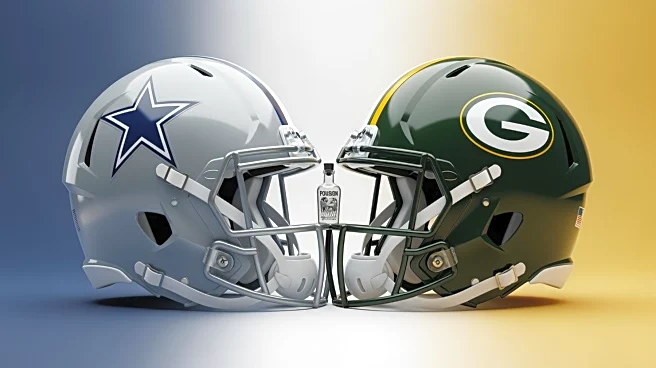What's Happening?
The Dallas Cowboys have traded star pass rusher Micah Parsons to the Green Bay Packers, incorporating a unique poison-pill provision in the deal. This clause mandates that if the Packers trade Parsons to any
NFC East team, they must surrender their 2028 first-round pick to the Cowboys. Similarly, if the Cowboys trade defensive tackle Kenny Clark, acquired in the same deal, to any NFC North team, they owe the Packers a 2028 first-rounder. The provision primarily targets the Philadelphia Eagles, a division rival and reigning Super Bowl champions, to prevent Parsons from joining them. The condition expires at the end of the 2026 season, and Parsons remains under contract with the Packers through 2029. The clause was discovered when other teams reviewed the NFL's draft pick database, adding complexity to the trade.
Why It's Important?
This trade and its poison-pill provision have significant implications for the NFL landscape, particularly affecting team strategies within the NFC East and North. By preventing Parsons from joining the Eagles, the Cowboys aim to maintain competitive balance within their division. The provision reflects strategic maneuvering to protect team interests and prevent rivals from gaining a competitive edge. It highlights the lengths teams will go to secure their future prospects and manage player movements. The deal also underscores the importance of draft picks in team-building strategies, as the potential loss of a first-round pick can influence future roster decisions.
What's Next?
The poison-pill provision is unlikely to be activated, given the complexities involved in trading Parsons before the condition expires. However, if the Packers and Eagles were determined to complete a trade, Philadelphia would need to offer substantial compensation to offset the loss of Green Bay's 2028 first-rounder. The provision adds a layer of intrigue to future trade negotiations and could influence how teams approach similar deals. As the 2026 expiration approaches, teams may reassess their strategies, potentially leading to new trade discussions or contract renegotiations.
Beyond the Headlines
The use of poison-pill provisions raises ethical questions about player autonomy and the fairness of restricting trade options. It reflects broader trends in sports management where teams employ complex legal strategies to safeguard their interests. This development may prompt discussions within the league about the appropriateness of such clauses and their impact on player careers. Additionally, it highlights the evolving nature of NFL trades, where strategic considerations extend beyond immediate player performance to long-term franchise planning.










